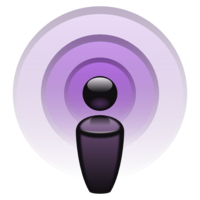Robinson, Alexis B.
From DigitalRhetoricCollaborative
Podcast
A podcast is a digital medium for delivering informative or entertaining content that is consumed audibly, sometimes accompanied by video. Podcasts typically consist of multiple episodes and can be accessed through the World Wide Web for online streaming and download at any time, a key distinction between podcasts and traditional radio.
Podcasts rose with the emergence of the Apple iPod, although it can be downloaded onto other MP3 players.
Contents |
History
Developed in 2004, podcasting was developed as "MTV video jockey Adam Curry and software developer Dave Winer" discovered a method of downloading broadcast radio programs directly from the World Wide Web onto an Apple iPod. [1] In 2005, Apple Inc. introduced a collection of 3,000 podcasts, made accessible through the Apple iTunes Store. Although podcasts are not subject to government regulation, those made available through the iTunes Store are filtered according to quality, copyright concerns, and sometimes content. By connecting podcasts with audience listeners, Apple facilitated a quick rise in popularity for the medium. In fact, "The New Oxford American Dictionary named a 'podcast' its official 'Word of the Year,' in 2005.[2]
Due to the success of podcasting, broadcast companies like BBC and NPR have made their content available for download online. This removes the inconvenience for listeners previously having to tune in at a specific time. [3]
Usage
Commonly produced by amateur entertainment personalities working out-of-home, podcasts are free of government restrictions on content and, because of the overwhelming number of stations, are often organized by genre. There are a number of online hosting sites where podcasters can publish their work, including SoundCloud, Archive.org,and AmazonS3. [4]Before hosting, the podcast must first be created. The process employs the use of a microphone and audio recording software[5], then once produced, the file can be uploaded to the Web for listeners to stream and download.
A survey conducted by BBC shows podcast listeners are primarily men at 69%, versus 31% being women.[6]
An Educational Resource
"ENGLISH FOR SPECIFIC PURPOSES: PODCASTS FOR LISTENING SKILLS"
In recent years, the use of this medium for educational purposes has become a topic of research and discussion. One study conducted by Mykolas Romeris University found that, "Podcasts enable students to practice listening in a self- directed manner and at their own pace."[7] The purpose of this study was to explore the potential for podcasts to improve listening skills. Research found, "the novelty and diversity of outside class listening motivates learners to perfect their skills without being observed by peers or teachers."[8] Therefore, podcasts used for educational purposes motivates students to study outside of the classroom setting. Enabling this flexible learning tool somewhat changes the dynamic of traditional schooling by eliminating intimidation that comes with pressure to perform well in front of instructors and classmates. This study focused on enhancing learning for English studies, but others have found benefits that reach students focused on other subjects including music, visual arts, nursing and chemistry.
External Links
References
- ↑ Watson, Stephanie. "Podcasting History - HowStuffWorks." HowStuffWorks. N.p., n.d. Web. 15 Apr. 2015.
- ↑ Kavaliauskienė, Galina, and Lilija Anusienė. "English For Specific Purposes: Podcasts For Listening Skills." Coactivity / Santalka 17.2 (2009): 28-37. Academic Search Complete. Web. 16 Apr. 2015.
- ↑ http://news.bbc.co.uk/2/hi/technology/4631051.stm
- ↑ Carlson, Tiffiny. "8 Best Sites to Host Your Podcast." TechNorms. N.p., 02 Jan. 2014. Web. 15 Apr. 2015.
- ↑ Carlson, Tiffiny. "8 Best Sites to Host Your Podcast." TechNorms. N.p., 02 Jan. 2014. Web. 15 Apr. 2015.
- ↑ Kavaliauskienė, Galina, and Lilija Anusienė. "English For Specific Purposes: Podcasts For Listening Skills." Coactivity / Santalka 17.2 (2009): 28-37. Academic Search Complete. Web. 16 Apr. 2015.
- ↑ Kavaliauskienė, Galina, and Lilija Anusienė. "English For Specific Purposes: Podcasts For Listening Skills." Coactivity / Santalka 17.2 (2009): 28-37. Academic Search Complete. Web. 16 Apr. 2015.
- ↑ Kavaliauskienė, Galina, and Lilija Anusienė. "English For Specific Purposes: Podcasts For Listening Skills." Coactivity / Santalka 17.2 (2009): 28-37. Academic Search Complete. Web. 16 Apr. 2015.

